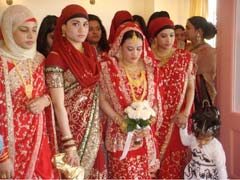- Trending:
- Pope Leo Xiv
- |
- Israel
- |
- Trump
- |
- Social Justice
- |
- Peace
- |
- Love

RELIGION LIBRARY
Sunni Islam
Rites and Ceremonies
Along with particular conceptions of sacred time and sacred space, most religious systems likewise sacralize the performance of certain actions, rites of passage, and significant life changes. Sunni Islam has particular ways of commemorating major moments in life, including childbirth, marriage, and death.
Unlike Catholicism, however, which counts baptism and marriage among its religious rites, or Judaism, which marks the passage into adulthood with a bar or bat mitzvah, Sunni Islam does not consider the traditions that surround events such as birth or marriage as religious rites.  Marriage, for example, is considered a legal agreement between two parties with its attendant contractual obligations. It can be drawn up in a mosque or in someone's home, and so long as the contract includes what is legally required for its validity (i.e., the agreement of both parties and other such requisites as delineated by a particular Sunni school of law), there is no particular ceremony attached to its existence.
Marriage, for example, is considered a legal agreement between two parties with its attendant contractual obligations. It can be drawn up in a mosque or in someone's home, and so long as the contract includes what is legally required for its validity (i.e., the agreement of both parties and other such requisites as delineated by a particular Sunni school of law), there is no particular ceremony attached to its existence.
This does not mean, however, that there are no traditions that accompany marriages in Sunni Islam. In fact, one widely practiced tradition is to have the bride propose marriage to the groom in the tradition of Khadija, Muhammad's first wife, who proposed to the Prophet. Another tradition that is widely practiced has the bride and groom use the phrase "in the tradition of the Prophet I agree to... etc." This marked reliance upon and explicit acknowledgement of the custom, or sunna of the Prophet is, a central component of Sunni identity.
Likewise, Sunnis mark other major life moments by traditions based on the behavior of Muhammad and his community. And, while these are not organized ceremonies per se, there is a ritual component to the way they are performed. This includes practices such as the ceremonial cutting of one's hair at the end of the Hajj, the  circumcision of an infant male, or certain celebrations upon the birth of a child (called an aqiqa). Because Sunnis take care to follow the established Sunna of Muhammad, often an Islamic scholar or imam is present at these events, though it is important to remember that an imam is not, strictly speaking, a cleric in the sense of a priest or a rabbi.
circumcision of an infant male, or certain celebrations upon the birth of a child (called an aqiqa). Because Sunnis take care to follow the established Sunna of Muhammad, often an Islamic scholar or imam is present at these events, though it is important to remember that an imam is not, strictly speaking, a cleric in the sense of a priest or a rabbi.
While it may seem, at first, that the life events considered to be sacraments in other faiths are not ceremonial in the same way in Islam, it would be a mistake to consider Sunni practice devoid of ceremony. In fact, as some scholars have observed, everything is potentially sacred in that the Sunna of Muhammad provides a model for behavior in even the most mundane aspects of life. Many people have opined that there is no real separation between the secular and the sacred in Islamic law, a statement that is derived from the idea that the shariah addresses family, civil, and criminal law as well as laws regarding acts of worship. In this sense, by invoking the model of Muhammad for everyday activities as well as momentous life moments, Sunnis apply, rather seamlessly, a sense of ceremony to many aspects of daily life.
Study Questions:
1. Why isn’t marriage considered a rite within Sunnism?
2. How has Muhammad’s behavior influenced Sunnism’s understanding of ritual?
3. How are ceremonies constructed within Sunnism?
4. Are the secular and sacred distinguishable within Islam? Why or why not?










